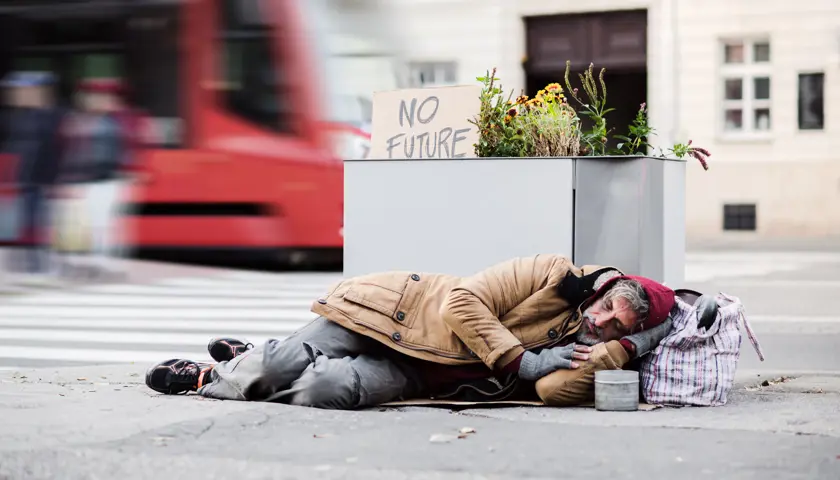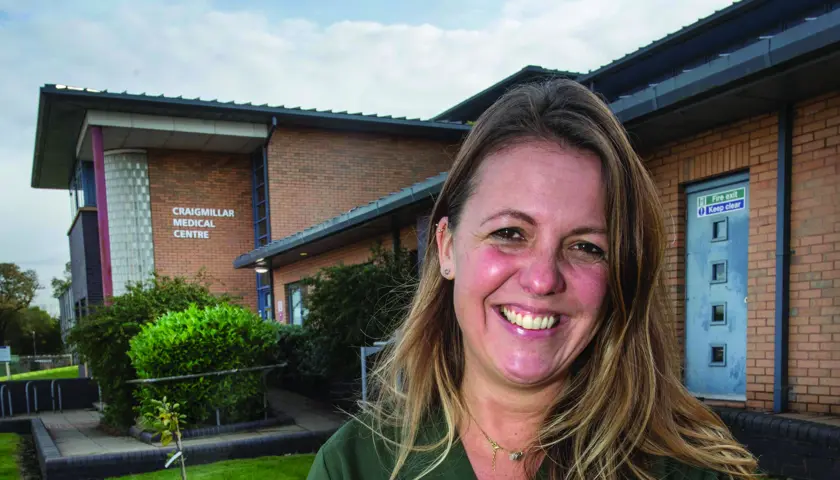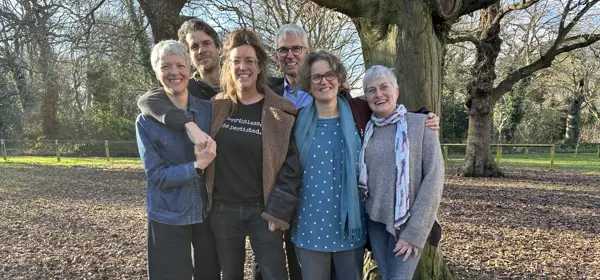Nowhere left to turn
Nowhere left to turn
The closure of a specialist GP practice serving homeless people has led to grave concerns about their care and the impact on other services. Another facility also fears for its future
Homeless patients living with mental and physical health problems and destitution have been left with nowhere to turn other than overstretched emergency departments following the closure of a specialist GP practice.
That is the warning from doctors and senior charity staff – who say they fear rising death rates, an ‘awful amount of harm’ and are witnessing people being excluded from healthcare – following the closure of Hunter Street in Glasgow.
The practice, which provided specialist primary care, outreach, and close links to a wide range of other services, was closed last year and local experts say the effects are being felt by the most vulnerable people in their communities – with many demanding the restoration of services.
The Doctor has learned that a review of the changes has been completed by Glasgow health leaders and is going through a ‘governance process’. No details of the process, its aims and scope, or conclusions were provided when requested.
Fears have also been raised about the future of a similar service in Edinburgh as board documents outlining massive savings requirements reveal nearly half of all cuts facing GP practices in the Scottish capital, which are run directly by the health board, are to fall on one practice – the city’s specialist homelessness primary care facility.
You have to take services to these people – you have to have services that are proactive
Glasgow homeless charity
A senior member of staff at a Glasgow homeless charity, whose identity has been protected, urged local health leaders to revisit their decision and return to previous service arrangements – asking why cuts would target the people who ‘need services the most’.
They said: ‘It’s an unfathomable decision.
‘Everybody knows the evidence. It’s irrefutable. But you might say that the managers in Glasgow are refuting it with their actions. You have to take services to these people – you have to have services that are proactive, flexible and very person-centred… Glasgow has taken a view that a normal primary care approach is appropriate. I don’t think anyone else in the country holds the view that those services are appropriate.
‘The really sad thing is we won’t know the full extent of this for probably quite a long time and it will come up in [emergency department] attendances, in death rates and in an awful amount of harm.’
Phil Wray, head of projects at Glasgow City Mission, a Christian charity which runs a day centre and emergency overnight accommodation for homeless people, says it has become difficult to register homeless people with a GP, that the charity is often sending patients to Glasgow Royal Infirmary’s emergency department, and that their clients now have to be in an ‘absolutely extreme’ situation to get support with mental health issues.
He says: ‘We see incredible value in having a [specialist] primary care service in the city centre.’
While local health managers say audits suggest patients have been registered at other local practices, doctors remain concerned.
Carey Lunan, chair of the Deep End group of GP practices which work in the most deprived communities in Scotland, says there were continuing reports about patients struggling to access general practice which highlight the need for a specialist service.
She says: ‘The reality is that non-specialist general practice does not receive the additional funding that is needed to be able to offer the kind of support and wrap-around care that these patients need at this very vulnerable point in their life – things like longer appointments, access to in-house mental health and addiction teams, housing officers and social workers too.’
Non-specialist general practice does not receive the additional funding that is needed
Carey Lunan
NICE (National Institute for Health and Care Excellence) guidelines around care for homeless people suggest they should, ideally, be cared for in a specialist setting. While NICE does not have force in Scotland, its guidelines are often cited there, as they are in other countries outside England and Wales.
Dr Lunan says the closure could mean there is no-one taking overall responsibility for homeless patients, for coordinating their care, helping them to navigate services or provide them with routine parts of general practice such as blood tests, wound checks, sick lines, prescriptions and many other things.
Andrea Williamson, a GP at Hunter Street for 18 years and professor of general practice and inclusion health at the University of Glasgow, says: ‘In terms of outcomes for people, the starkest inequalities in health are experienced by people who are homeless… But as systems come under pressure it so often seems to be that the bits of the service that are most needed, but perhaps there won’t be as much of a fuss about, are cut first.
‘People experiencing homelessness… have often had quite difficult negative experiences with healthcare, so they aren’t the sort of people who are going to put a letter in their local paper or register a complaint… In general these people don’t feel empowered. If this had been a service located in a middle-class area for middle-class patients there would have been an enormous fuss.’
Safe discharge
A doctor working in a Glasgow emergency department told The Doctor that many ‘demoralised’ colleagues are ‘concerned’ and feel they have seen an increase in attendances since the specialist practice closed – with services already under ‘the most pressure ever’.
They say: ‘The worry from us is that these people turn to the emergency department or become a more frequent attender and with a higher likelihood of admission if we don’t have a safe discharge plan because often specialist primary care and services in the community are the sorts of things we would refer back to from the emergency department.’
A statement from the Glasgow Health and Social Care Partnership, which made the decision, said its review aimed to ‘focus resources through a complex-needs service, which looks to work with community GPs in a ‘proportionate manner’. It said an ‘urgent care and bridging service’ had been put in place to assist people to register with GPs and claimed patients previously registered with the homeless practice have ‘sustained registration within the community’.
One local healthcare professional said the complex-needs service does ‘great work’ but has a very small caseload and that, in their experience, lots of patients who need care do not meet thresholds for access and are left stranded.
In a subsequent statement the partnership said it was ‘not aware of any evidence to suggest that the health outcomes of people experiencing homeless [sic] is affected by the way in which primary care is delivered’.
Homeless practices cater for patients who experience many of the highest health inequalities in Scotland
Dr Buist
Healthcare staff and local charity leaders have told The Doctor that, from their perspective, there was little to no engagement, no evidence shared of any impact assessments or planning documents and that patients and staff were bemused by what appeared to be a sudden change. Some raised concerns about a lack of monitoring of the effects since the changes and many took issue with the partnership’s claims about a lack of evidence of the importance of primary-care delivery to homeless people. One described themselves as ‘speechless’.
In its statement, the partnership said it had ‘engaged actively’ with staff working at Hunter Street, third-sector organisations, people with lived experience and unions. It suggested efforts – including contacting patients, prescribing four weeks’ worth of medication, and a seven-week period where some clinical and administrative staff worked to ‘ensure’ the care and safety needs of registered patients – had been made to minimise negative effects.
The Doctor has requested any impact assessments carried out by the partnership prior to making the decision as well as a copy of any reviews carried out subsequent to the decision under the Freedom of Information Act. At the time of writing this request has not been responded to but remains within legal timeframes.
In recent weeks it has emerged health leaders have also cut £200,000 from the budget of the specialist GP practice for homeless patients in Edinburgh, known as either The Access Place or The Access Practice.
The Edinburgh Health and Social Care Partnership has outlined £59.7m worth of cuts as part of its ‘savings and recovery programme’ with £440,000 falling on nine health board GP practices in Edinburgh.
Financial pressure
Almost half of that total amount is to come from a ‘review of non-core activity’ at the practice. In a document outlining the savings health bosses suggested they did not anticipate any ‘significant adverse impact’ as a result of the cuts but that a ‘full integrated impact assessment’ would be needed to confirm the effect of changes to the scope of the practice.
Pat Togher, the chief officer of the Edinburgh Integration Joint Partnership, the body which outlined the cuts, says Edinburgh is facing ‘unprecedented financial challenges’ but that the measures aim ‘not to cut services to vulnerable people wherever possible.’
The Doctor posed a number of questions to the partnership after being provided with this statement – including questioning what ‘wherever possible’ means in practice, requesting a breakdown of the £200,000 cuts and what that money was spent on previously, whether the partnership recognised the concerns of doctors about the effect on patient care, and whether this marks the beginning of a move away from commitment to a specialist model of homeless primary care. At the time of going to press the majority of these questions – sent on Friday, 3 May with a reply promised – have not been responded to.
The Doctor understands health professionals in Edinburgh are concerned about the future of the practice, with some fearing services such as psychology, psychiatry, housing, social work
and substance misuse would be under threat, potentially affecting general practice care provided. One GP said the move was ‘morally wrong and doomed to fail’.
Dr Lunan says the Deep End group is ‘concerned’ that a worrying precedent had been set by the closure of Hunter Street in Glasgow – particularly given the ‘difficult financial times’.
She says: ‘It is important we learn lessons from the situation in Glasgow, and work together to make sure that a safe, high-quality, accessible and inclusive general practice service is available to anyone experiencing homelessness.’
BMA Scottish GPs committee chair Andrew Buist says: ‘This is a very regrettable development as there’s no doubt the homeless practices cater for patients who experience many of the highest health inequalities in Scotland with consequently the poorest health outcomes. It is also quite likely this move will just result in higher costs elsewhere in the NHS, including more attendances at [emergency departments].’
- Until September 2024, resident doctors were referred to as ‘junior doctors’ by the BMA. Articles written prior to this date reflect the terminology then in use





